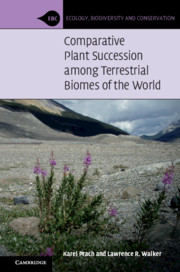Book contents
- Comparative Plant Succession among Terrestrial Biomes of the World
- Ecology, Biodiversity, and Conservation
- Comparative Plant Succession among Terrestrial Biomes of the World
- Copyright page
- Contents
- Preface
- 1 Introduction
- Part I Plant Succession and Biomes
- Part II Succession by Disturbance Type
- 4 Comparative Approach
- 5 Volcanoes
- 6 Glaciers
- 7 Cyclones
- 8 Dunes
- 9 Landslides
- 10 Floods
- 11 Fire
- 12 Clearcuts
- 13 Plowed Fields
- 14 Mines
- 15 Other Disturbances
- Part III Synthesis
- Book part
- References
- Index
13 - Plowed Fields
from Part II - Succession by Disturbance Type
Published online by Cambridge University Press: 08 May 2020
- Comparative Plant Succession among Terrestrial Biomes of the World
- Ecology, Biodiversity, and Conservation
- Comparative Plant Succession among Terrestrial Biomes of the World
- Copyright page
- Contents
- Preface
- 1 Introduction
- Part I Plant Succession and Biomes
- Part II Succession by Disturbance Type
- 4 Comparative Approach
- 5 Volcanoes
- 6 Glaciers
- 7 Cyclones
- 8 Dunes
- 9 Landslides
- 10 Floods
- 11 Fire
- 12 Clearcuts
- 13 Plowed Fields
- 14 Mines
- 15 Other Disturbances
- Part III Synthesis
- Book part
- References
- Index
Summary
In this chapter, we consider situations in which plowed fields are left without cultivation following growth of a final crop. The crop is usually harvested but sometimes is left in place and may provide some legacy from the previous use and influence subsequent succession. Thus, succession usually starts on bare ground but with an agricultural (weedy) seed bank present, and with developed soil, though the soil is sometimes degraded by intensive use. Consequently, plowed fields represent clear examples of secondary succession (Burrows, 1990). Other terms for unused plowed fields include abandoned fields, fallows, or old fields (Cramer & Hobbs, 2007).
- Type
- Chapter
- Information
- Publisher: Cambridge University PressPrint publication year: 2020

